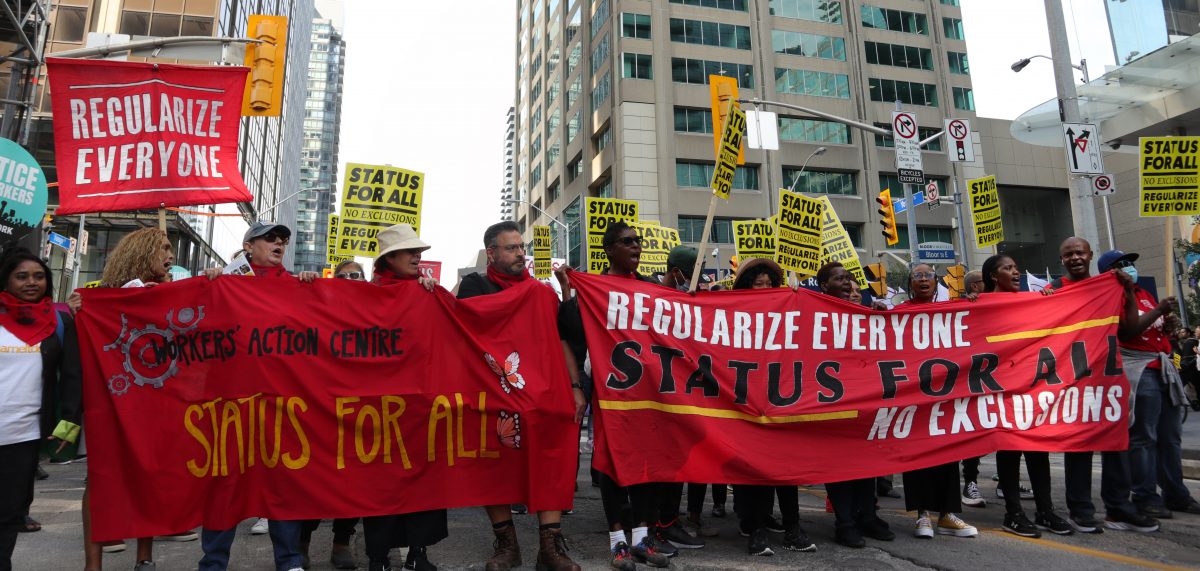Thousands of protesters rally across Canada in support of ‘Status for All’
Thousands of protesters rally across Canada in support of ‘Status for All’

Downtown Toronto rally. Photo: Sophia de Guzman
By Sophia de Guzman
LJI Reporter
The Philippine Reporter
TORONTO — Hundreds of protesters gathered at the intersection of Bloor St. and Yonge St. in downtown Toronto Sunday (Sept. 17) to rally for the regularization of all temporary and undocumented workers in Canada.
“I am a personal support care worker. I have served the community, I have served the seniors and as we speak I am undocumented. So we are calling upon the Prime Minister of his promise,” said Jane a member of Migrant Workers’ Alliance for Change.
This rally was part of a series of nationwide mobilization, led and organized by the Migrant Rights Network, a network of progressive migrant workers’ rights advocacy organizations across the nation. Much of the day’s campaign called upon Prime Minister Justin Trudeau to “keep his promise”, referring to a mandate letter issued by the Prime Minister to then Minister of Immigration, Refugees and Citizenship Sean Fraser to “further explore ways of regularizing status for undocumented workers who are contributing to Canadian communities.”
The Toronto rally took place in tandem with rallies in several major cities in Manitoba,
British Columbia, Alberta, Ontario, Nova Scotia, Newfoundland and Labrador, and
Yukon, totalling 15 protests nationwide. The rallies took over various spaces in these cities, ranging from busy city streets to the fronts of politicians’ offices, including the office of Minister Marc Miller, current Minister of immigration, Refugees and Citizenship.
Migrant Rights Network slotted its “Day of Action” for the 17th, the day before Parliament returned from summer vacation. The organization has seen the plan of the Canadian government to lower the cap of issued international student visas. International Student Organizer for the Migrant Workers’ Alliance for Change, Sarom Rho argues that immigrants, like international students, contribute more to the economy more than they take from it, rather those in charge of the housing economy are the ones to blame.
“Developers, landlords, and profiteers are the ones responsible,” said Rho.
Former Minister of Immigration, Refugees and Citizenship Sean Fraser, who received Trudeau’s letter about the regularization program initially, proposed the cap on international students during a cabinet retreat in August as, “one of the solutions Ottawa may consider” to the housing affordability crisis across Canada. The current minister, Marc Miller agreed that the proposed cap was a viable solution in an interview at CBC’s show The House a few days after. He added that the number of international students coming into the country may threaten the “integrity” of the immigration system itself, bv stating that some international students may see it as a “back door” into the country.
Since receiving backlash for his statements, the minister has said that Canada has not yet implemented this cap.
The network also organized a similar “day of action” earlier this year, on International Day to End Racial Discrimination, which took place in six cities across the country to lobby for a university regularization program. This rally was coordinated to happen ten weeks before Parliament rose for the summer, also an effort to pressure the regularization program to the top of the agenda for the members of Parliament.
Member organizations, such as the Migrant Workers’ Alliance for Change have been working this summer to develop alliances with other local organizations who serve marginalized groups through joint events that work to bring awareness to the roles that temporary and undocumented migrant workers hold in Canadian society, and the challenges they face due to their immigrant status.
The Philippine Reporter covered one of these events earlier in August, where MWAC engaged with the Jane-Finch Action Against Poverty to foster community discussion about migrant rights’ issues in the Jane and Finch neighbourhood.
The Jane-Finch neighbourhoud has one of the highest populations of immigirants in Toronto, with 61 per cent of the population being immigrants, according to research compiled by a report published in 2020 by the Jane-Finch TSNS Task Force. Several of these ally organizations attended the march, including the Jane Finch Action Against Poverty and the Ontario Nurses’ Association.
“There’s no question about what the solution is – it is just treat international students, migrant farmworkers, care workers, refugees and undocumented workers like everyone else. The only way that’s possible is for everyone to have a safe immigration status,” said Saron Rho.
Comments (0)